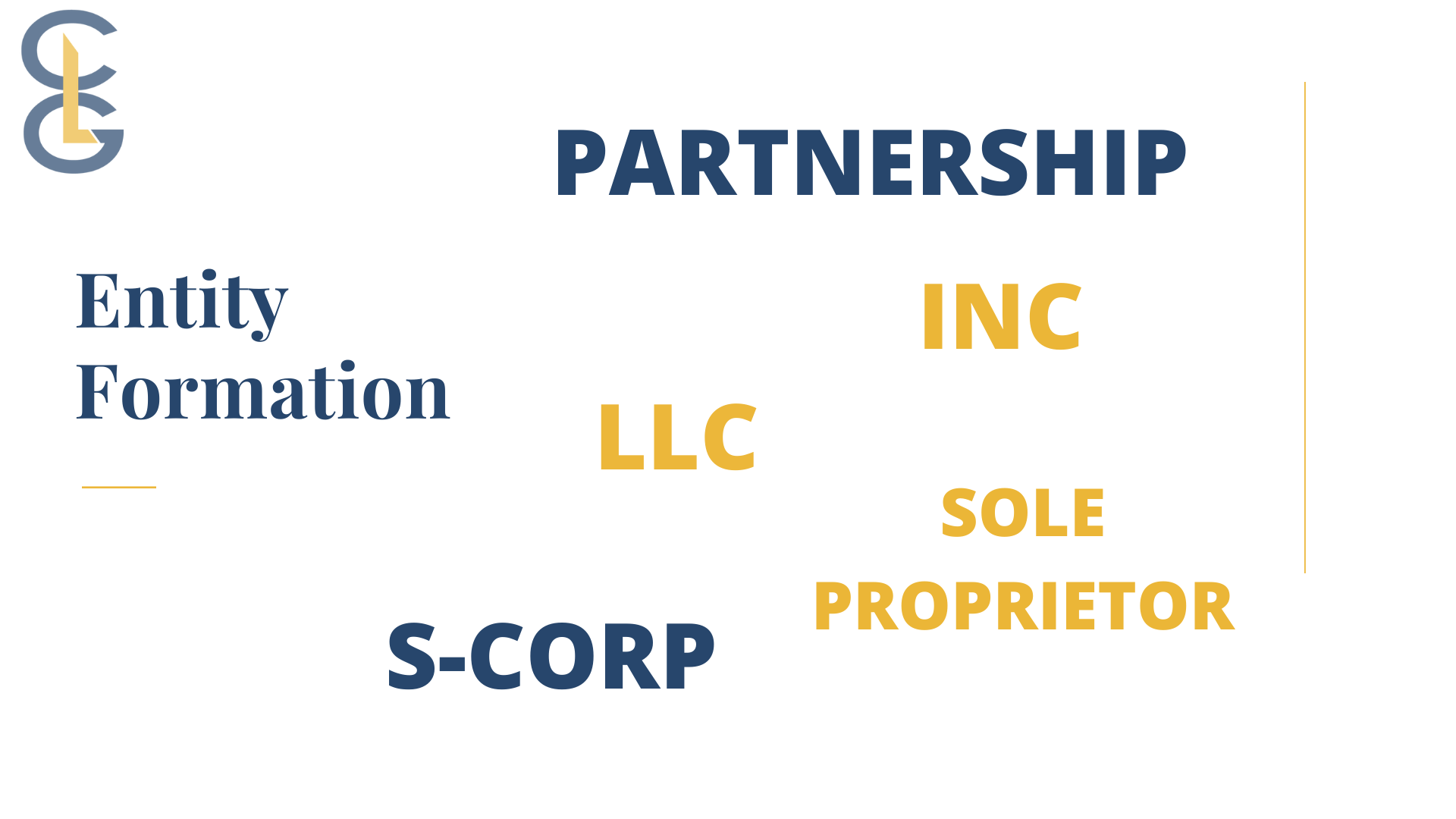Call Now For Your Free Consultation!
4 Locations to Serve You:
Call Now For Your Free Consultation!
What There is to Know about Entity Formation
If you’re in the process of forming a new business, it would not only be in the company’s best interest, but for you as the owner as well to make sure everything is following your specific state and county guidelines. Attorney Taylor Davidson speaks on the importance of entity formation, the difference between the business entity types, how it can impact not only your liability, but taxation as a business owner, and how to go about establishing the right entity for your business.
Entity formation is the legal process of formally registering your business with the state. You are free do business in Tennessee without any formal paperwork, but unless you register your business with the State of Tennessee through the Secretary of State, you won’t have any liability protection for your business. While you may be operating underneath a business name, if you were to ever get into any kind of legal trouble/any issues that had to do with your business, anything that happened will be attached to you personally and not to your business. That’s one of the main benefits of registering your business with the Secretary of State; so people know that your business is separate from you personally. Otherwise, there’s no way to tell what’s you and what’s your business.

THE BIG 3:
When it comes to determining which entity is best, a lot of the times it’s a tax question, which is where your accountant can come in and guide you based on what your expected gross revenue is going to be, the number of employees you plan on having, and the type of business you’re going to be doing. A Limited Liability Company (LLC) is probably the most popular vehicle; it’s easy to form, easy to maintain, and easy to use. To form an LLC with the State of Tennessee, it costs about three hundred (300) dollars in fees that are due to the Secretary of State Department. This three-hundred-dollar fee is due again each year that you are doing business to maintain your liability protection. There are also special taxes that apply to LLC’s, including the state franchise and excise tax. LLC formation is also popular because it is known as a “pass through entity” for Federal Income tax purposes. This means you won’t have to file a separate income tax return for your LLC; you’ll just report whatever profits or revenue you collected from your LLC on your individual income tax return that you file each year. A lot of people decide to go this route because it is easier when it comes to filing taxes, but being taxed at the individual rate at what your income tax bracket is should still go into consideration. When you get above a certain income threshold and your LLC is generating a certain amount of revenue, an LLC may no longer be the best vehicle for your business. You can elect to tax your LLC as a corporation, or you can just form a corporation.
There are two major kinds of corporations: a sub-chapter S corporation (S-Corp) and a regular corporation (commonly referred to as a C-Corp). A C-Corp is exactly what you think it would be when you think of a corporation; there are few restrictions on transfers of ownership shares, or stocks, and large amounts of investors can purchase and trade ownership stock in the C-Corp. Smaller businesses with large gross annual revenues typically chose to form an S-Corp, which are commonly referred to as “closely held” corporations. This means there are substantial restrictions on transferring stock and ownership shares and ownership can only be held by a certain number of people. Any potential transfer of stock must follow specific steps and guidelines laid out in both the IRS Code and the company’s bylaws.
When it comes to taxes, both an S-Corp and a C-Corp are taxed at the applicable corporate tax rate. As mentioned previously, if your business is generating a certain amount of revenue each year, the corporate tax rate may be beneficial. Corporations, in general, tend to receive a more favorable tax rate from the IRS under current tax laws.
To file a Corporation with the Secretary of State of Tennessee, you must pay a one-hundred (100) dollar fee to the State. Similar to the LLC, this fee is due annually as long as you continue to do business in Tennessee. The fees may be a bit less than an LLC, but there are more moving parts that sometimes pose challenges to a smaller business.
Another option potential business owners have is to form a Limited Partnership. A Limited Partnership is still filed with the Secretary of State, but in this situation, it’s usually two or more people, and there is a limited partner and a general partner involved. A general partner is the person that manages the business on a day-to-day basis and the limited partner takes on the role of a passive investor. There is a lot of room with a Limited Partnership in the sense that more than one partner can hold a General Partner or Limited Partner interest. A common tool used to limit the liability of the partners is to hold 1% of that partner’s ownership interest as a General Partner, and the remaining portion of that partner’s share as a Limited Partner. A well-drafted Limited Partnership Agreement can make all the difference for this type of business entity.
Aside from the management roles that are assigned to each type of partner, there is another critical main difference between a general and a limited partner: a General Partner is personally liable for any liabilities that may arise within the business, while the Limited Partner has near complete liability protection. With that being said, nothing that happens to the business can be attached to the Limited Partner.
Once you have learned a little bit about the different entities that can be associated with your business, anyone can go online and file the applicable forms with the Secretary of State. You will also need to obtain what’s called a Federal Employer Identification Number, also known as an EIN, from the IRS. Obtaining an EIN is what allows a new business owner to open a bank account under the business name. Even if you do not plan on having any employees, you still will need an EIN. All of this is easy to do yourself, especially with all the online tools.
One may ask: If I can do this all myself, why should I think about hiring an attorney?
An attorney can offer specific expertise and advise about selecting the appropriate business entity for you and ensuring that you have complied with all applicable statutes and laws. For example, if you have decided to form a multi-member limited liability company, then you are required by the statute to have what’s called an Operating Agreement. Single-member LLCs don’t necessarily need an operating agreement, but it is still strongly recommended. This document lays out the ground rules for how money will flow into and out of the company.
For multi-member LLCs, this Operating Agreement can be between fifteen and twenty pages long. For single-member LLCs, the Operating Agreement will obviously be shorter, but it lays out the necessary groundwork that grants the member of the company the authority to do certain things on behalf of the company, such as open bank accounts and enter into contracts. Some insurance companies won’t issue insurance without an operating agreement, even to a single-member LLC, because they want to know that whoever they’re in contract with has the authority to bind the company to said contract. Operating Agreements are complex legal documents and are essentially a contract between the owners of the company and the business itself. Even if you are the sole member in your LLC and an Operating Agreement is not required by the Tennessee law, an Operating Agreement is still a formal way to lay out that you are the owner of the company and that you have the authority to make the decisions for your business.
Aside from writing up contracts and other legal documents for you or your business, hiring an attorney can be beneficial in other ways as well. For example, when it comes to owning a business, there’s multiple taxes you’re going to have to register for as a company. As attorneys, we will work with you and your accountant to help you get those accounts registered. If you’re selling any goods or services, you’re going to need to file business tax in each county you’re going to be doing business in. If you’re a construction company, you’re going to need to follow specific licensing requirements. This is where an attorney can step in and walk you through what the Department of Revenue and other state agencies require in terms of licensing. Just because you formed your company, doesn’t mean you’ve completely checked off all the boxes, which is where we can step up to help.
CONTACT INFORMATION
Phone: (855) 500-1334
Email: info@cobblawtn.com
Visit Any of Our 4 Convenient Locations Below!
BUSINESS HOURS
- Monday
- -
- Tuesday
- -
- Wednesday
- -
- Thursday
- -
- Friday
- -
- Saturday
- Closed
- Sunday
- Closed
- Monday
- -
- Tuesday
- -
- Wednesday
- -
- Thursday
- -
- Friday
- -
- Saturday
- Closed
- Sunday
- Closed

Locations:
131 Walton Ferry Rd., Ste. 11, Hendersonville, TN 37075
2525C Lebanon Pike, Ste. 201,
Nashville, TN 37214
2550 Meridian Blvd., Ste. 200,
Franklin, TN 37067
5050 Poplar Avenue, Ste. 1416
Memphis, TN 38157

